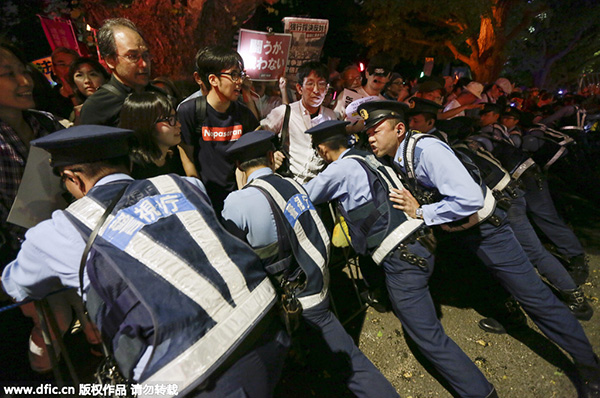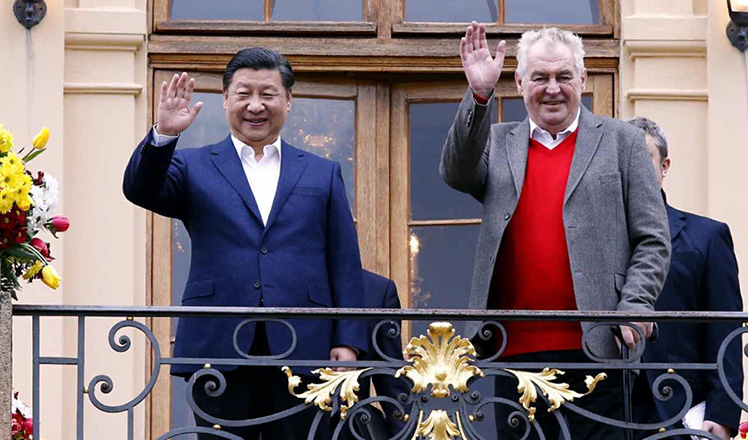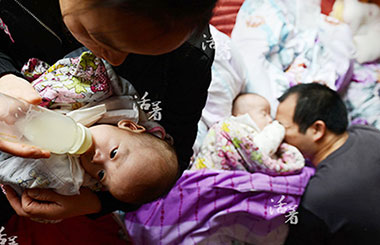Japan's moves threaten regional peace and stability
Updated: 2016-03-30 07:32
(China Daily)
|
||||||||
 |
|
Japanese policemen contain protesters as they demonstrate against Japan's controversial national security bills in front of Japan's parliament building in Tokyo, Japan, Sept 14, 2015. [Photo/IC] |
On Monday, a radar station on Japan's Yonaguni Island manned by about 160 Self-Defense Forces personnel came into service, about 150 kilometers from the Diaoyu Islands.
On Tuesday, Japan's controversial new national security laws, which allow the SDF to engage in combat overseas and exercise "collective self-defense", took effect. They are said to be indispensable for a more "proactive" Japan aspiring for greater contributions to global "peace and security".
In theory, and in the official rhetoric, neither move is targeted specifically at China.
But it would be dangerous to look aside from the game-changing potential of such moves, as well as the direct threat they represent to China.
Militarization of the southwestern-most island of Japan is only the beginning of a wider military build-up along the Japanese island chain. Even without the "in-private" murmurs heard in Tokyo, everybody knows this is being done with China in mind.
And there seems no way to change it.
Over 90 percent of constitutional experts in Japan believe the new laws are unconstitutional. Numerous polls in Japan have shown the majority of Japanese people oppose them. The public has protested. So have neighboring countries. Yet the laws survived parliamentary scrutiny.
With Shinzo Abe's ruling coalition holding a commanding majority in both houses of the Diet, the demise of the war-renouncing Article 9 of the Japanese Constitution seems to be just a matter of time and procedure.
Worrisome changes will ensue; including in the South China Sea, where Tokyo has been tirelessly fanning the flames between disputing parties. Sending SDF vessels to patrol there will mean readiness to confront China on a broader front.
Beijing has expressed the hope that Tokyo will "do more that facilitates regional peace and stability, instead of the opposite". Tokyo is doing exactly the opposite.
With Abe trying desperately to put the South China Sea issue on the table of the upcoming G7 summit, Beijing should not let the vain hope for "friendship" get in its way of coping with a now-very-different Japan. A Japan determined to be the US' foremost pawn in the containment of China. A Japan that seems prepared for long-term confrontation with China.
Talks with Tokyo are fine, as long as they are conducive to preventing or managing a crisis. But our policies should always be grounded in what is happening, not what we wish would happen.
The truth is China-Japan relations have just reached a watershed, and they are entering an era brimming with uncertainties.
- US officials applaud China for nuclear cooperation
- Beyonce, Easter Bunny highlight Obama's final egg roll
- Egypt Air flight hijacked and lands in Cyprus
- Brazil party set to abandon Rousseff
- Man shot and wounded by police at US Capitol complex
- One terror suspect arrested in Rotterdam at France's request

 Czech President Milos Zeman hosts Xi at private residence
Czech President Milos Zeman hosts Xi at private residence
 The snow-white world of a tombstone carver
The snow-white world of a tombstone carver
 Conjoined twins' operation bittersweet for family
Conjoined twins' operation bittersweet for family
 Airplane- enthusiast farmer builds 'military helicopter'
Airplane- enthusiast farmer builds 'military helicopter'
 69 killed, 300 injured as suicide blast hits Pakistan on Easter
69 killed, 300 injured as suicide blast hits Pakistan on Easter
 Shanghai Disneyland fans endure long wait, high ticket prices
Shanghai Disneyland fans endure long wait, high ticket prices
 Giant pink 'Floating Fish' displayed in E China
Giant pink 'Floating Fish' displayed in E China
 First lady Peng Liyuan leads fight against tuberculosis
First lady Peng Liyuan leads fight against tuberculosis
Most Viewed
Editor's Picks

|

|

|

|

|

|
Today's Top News
Marriott unlikely to top Anbang offer for Starwood: Observers
Chinese biopharma debuts on Nasdaq
What ends Jeb Bush's White House hopes
Investigation for Nicolas's campaign
Will US-ASEAN meeting be good for region?
Accentuate the positive in Sino-US relations
Dangerous games on peninsula will have no winner
National Art Museum showing 400 puppets in new exhibition
US Weekly

|

|







